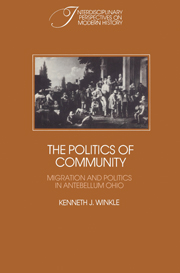Book contents
- Frontmatter
- Contents
- List of tables and figures
- Preface
- Introduction
- 1 The tide of emigration
- 2 An electorate in motion
- 3 From meeting to election: migration and suffrage
- 4 The defended community: migration and elections
- 5 “A movable column”: migration and voting
- 6 The core community: migration and leadership
- 7 Migration and local politics: an antebellum election
- Conclusion
- Notes
- Bibliography
- Index
3 - From meeting to election: migration and suffrage
Published online by Cambridge University Press: 06 October 2009
- Frontmatter
- Contents
- List of tables and figures
- Preface
- Introduction
- 1 The tide of emigration
- 2 An electorate in motion
- 3 From meeting to election: migration and suffrage
- 4 The defended community: migration and elections
- 5 “A movable column”: migration and voting
- 6 The core community: migration and leadership
- 7 Migration and local politics: an antebellum election
- Conclusion
- Notes
- Bibliography
- Index
Summary
The hundreds of thousands of migrants who settled in Ohio before the Civil War depended wholly on their adopted state to grant them rights of citizenship and suffrage. Today, the federal government protects the rights of interstate migrants. Americans are free to move from one state to another unimpeded and to enjoy the full benefits of state citizenship soon after their arrival. Recent Supreme Court decisions have reaffirmed the right of Americans “to travel throughout the length and breadth of our land uninhibited by statutes, rules, or regulations which unreasonably burden or restrict this movement.” In particular, the Supreme Court has struck down state laws that prevent or impede interstate migration and those that discriminate against newcomers for extended periods after their arrival. States can no longer, for example, ban paupers from crossing their borders, as California did during the Great Depression. And they can no longer impose lengthy residence requirements for the exercise of rights such as voting or the receipt of welfare payments, two of the most important rights the Supreme Court has guaranteed to migrants in recent years. Today, the 50 states impose on voters an average residence requirement of just 24 days, and in fact migrants to three states – Wisconsin, Kansas, and Oregon – can exercise full political rights the day after their arrival.
Before the Civil War, however, interstate migrants suffered many more legal disabilities and couldn't depend on much protection from the federal government.
- Type
- Chapter
- Information
- The Politics of CommunityMigration and Politics in Antebellum Ohio, pp. 48 - 70Publisher: Cambridge University PressPrint publication year: 1988



